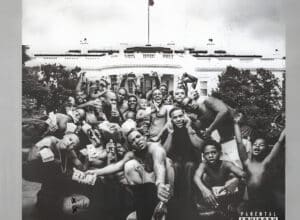Released: 2024
Kendrick Lamar’s song “Man at the Garden” delves into themes of self-worth, aspiration, and resilience. It captures a journey toward claiming the rewards and recognition that Kendrick believes he and those around him deserve. Through this track, Lamar lays bare his ambitions, struggles, and reflections, wrapping it in a profound message of self-assertion.
The song begins with a compelling hook where Lamar sets the tone with declarations of “I deserve it all.” This mantra reflects a yearning for emotional and physical stability, symbolized through metaphors of sound body, tranquility, and successful investments. It’s more than just a wish list—it’s a reflection of aspirations for balance and prosperity. In this line, Lamar underscores his right to these luxuries and peace, grounded in his understanding of self-worth.
The verses are deeply reflective, interspersed with vivid imagery and confident declarations. Lamar talks about owning material wealth—white diamonds, a reclining GNX—and lavish experiences such as beachfront homes and private flights. Yet, each statement is loaded with the weight of deservingness. These aren’t mere symbols of wealth; they are benchmarks of the respect and legacy he’s cultivated, hard-earned markers of his journey.
Continuing through the verse, Kendrick insists that respect and accolades, alongside peace of mind, are his due rewards. The reference to “watching Cast Away” suggests moments of solitude and introspection. By aligning his right to these privileges with the losses he’s endured—like good friends who’ve passed away—Lamar bridges the personal with the universal, anchoring his narrative in both loss and triumph.
He touches on historical continuity and societal impact, invoking how ancestors’ prayers fortify his claim to “all”. This aspect of deservingness isn’t about self-centered ambition, but a broader responsibility to those who’ve come before him and those who will come after. It speaks to a cycle of legacy and empowerment, positioning Lamar not just as a recipient of generational sacrifice but as a conduit for its benefits.
Kendrick delves deeper into personal aspects, emphasizing routine discipline like “wakin’ up at 6:00 a.m” and self-care as further credentials for his deservingness. His reflections about relationships—where truth-telling and genuine friendship take precedence over kinship bonds—showcase an ethic of honesty and sincerity as central to his identity and what he offers the world.
The narrative then expands to his community and family, marking a transition from individual achievement to collective betterment. Kendrick speaks about the murals in Compton and a promise kept, broadening his narrative of deservingness to encompass community uplift. His reflections about his mother, daughter, and son encapsulate a legacy that transcends his individual aspirations, extending into future generations.
Kendrick’s references to maintaining integrity despite the negativity thrown his way, highlights a conflict between personal authenticity and external perceptions. Lines about his ‘famous’ versus ‘shameless’ self hint at duality, revealing a constant battle with the world’s views. These lines also reveal Kendrick’s complex relationship with fame and criticism, marking it as a constant, turbulent struggle.
In conclusion, the track ‘Man at the Garden’ by Kendrick Lamar is a manifesto of entitlement, not out of hubris, but from a place of knowing one’s worth through lived experience, discipline, and historical consciousness. He invokes blessings and generational strength, countering any adversities faced, emphasizing his commitment to maintaining personal integrity.
The phrase “I deserve it all” reverberates as a central theme—an assertion not only of desires but also of earned achievements. Kendrick’s discourse on legacy, self-worth, and authenticity establishes him as a pillar not only within hip-hop but within the broader narrative of American cultural history. The song invites listeners to question what they truly deserve, blending personal narrative with wider societal reflections.








